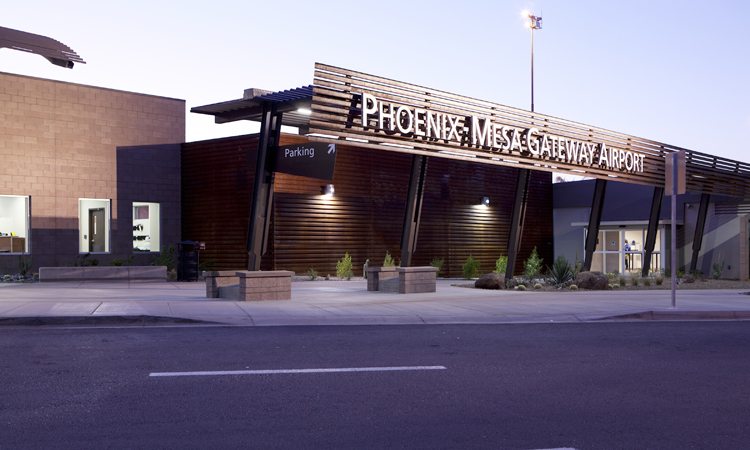As proposed plans for the SkyBridge expansion at Phoenix-Mesa Gateway Airport make their way to the airport authority board in March, local business and political leaders are optimistic cargo could become a big business in the Southeast Valley.
The airport authority board is expected to consider the master development plan at their March 22 meeting, the airport’s Executive Director and CEO Brian O’Neill said. From that point, their partners at real estate company Mesa SkyBridge LLC will work in conjunction with the airport authority to finalize a master lease agreement, which would detail the extent to which the airport would grow over the course of a proposed 49-year relationship.
If the lease agreement is agreed upon in March, the early phases of the proposed 49-year plan could begin as soon as 2019, O’Neill said. That would include a proposed taxiway extension and road, sewer and water systems renovations to support additional SkyBridge infrastructure.
The development of additional infrastructure on airport grounds is one aspect of the plan developed by Mesa SkyBridge, in conjunction with the airport authority. The other is the Unified Cargo Processing Program, which would bring U.S. and Mexican customs officials together at Gateway Airport to inspect and pre-clear cargo for travel from Mesa to Mexico City.
There was an opportunity for the SkyBridge processing system to fill a void that existed in Mexican-American cargo transportation, said Jenn Daniels, Gilbert Mayor and chairwoman of the airport authority board.
“It’s a tremendous opportunity that doesn’t exist anywhere in the country,” Daniels said.
In conversations with local freight companies, O’Neill said his team has discovered a customs clearing process in Mexico City that can take as long as two weeks. There are around 200 airports in Mexico, but only 14 feature customs and immigration clearance stations, O’Neill said. If the UCP program were adopted, retail companies could potentially offer their customers next-day delivery.
“Over the past two years, the e-commerce industry in Mexico has been accelerating greatly,” O’Neill said. “When you are a Mexican consumer and order something online, it can take quite a long time to get from the company that is shipping the product to its final destination.”
Jorge Quijada, the Business Development Manager at BC Logistics LLC in south Phoenix, said his company has had similar experiences dealing with Mexican customs. BC’s primary business in Mexico is delivering equipment and raw materials to Mexican manufacturing plants run by foreign companies. It takes BC’s cargo at least two or three days to get to the U.S.-Mexican border, at which point documentation and inspection determine the speed of its deliveries.
“By having both Mexican and American customs [in Mesa], it is going to guarantee that when [cargo] is approved here, there is going to be no delay,” Quijada said.
Quijada has participated in three meetings with the SkyBridge team, and has been involved with the UCP program since it was pilot-tested in Nogales and Tijuana in 2017. Previously, United States customs officials were sent to inspect products assembled at the manufacturing plants before those products could be shipped back to the U.S. for purchase.
Quijada echoed the idea that the UCP program could make a big difference for both retailers and consumers.
“Between the maquiladoras and the customers on both sides of [the border], the meetings that we’ve had are really positive. They want this bridge to happen,” he said, using the Spanish word for the Mexican manufacturing plants run by foreign companies.
The version of the development plan that the authority board will consider in March is expected to create thousands of jobs and inject millions of dollars into the local economy, O’Neill said.
Gateway Airport currently contributes about $1.3 billion to the local economy thanks to money its 700,000 passengers from outside of Arizona spend after they disembark, according to internal estimates. The airport currently employs 2,500 people itself, but O’Neill said that around 10,000 local jobs have been created to support local airport activity.
Currently, Gateway Airport does not process any international cargo. Communications Director Ryan Smith said the airport averages between 50 and 100 flights transporting cargo domestically, which amounted to over 214,000 pounds.
Adopting the proposed expansion would not only change the airport’s business, but in this early stage of the process, many also believe it has the potential to provide a substantial boost to the East Valley economy.




